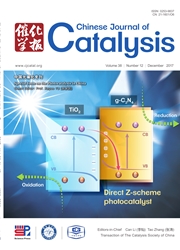
欢迎您!东篱公司
退出

 中文摘要:
中文摘要:
通过ICP-AES和XRD等表征手段,考察了稀土金属Ce化合物对Cu基氧氯化催化剂活性及稳定性的影响.研究表明,Ce在反应初期转变成的CeO2具有储存和传递氧的功能,从而提高催化剂的活性.在400℃反应300h后,催化剂的活性显著下降,其原因是由于86%的Ce与载体发生作用,生成难溶的物质,失去助催化的作用.同时,随着反应的进行,CeO2晶相晶粒长大也造成催化剂活性下降.
 英文摘要:
英文摘要:
The influence of the presence of cerium in the copper-based catalyst for HC1 oxychlorination was investigated by ICP-AES and XRD characterization. Cerium chloride was transformed to cerium oxide at the beginning of the reaction, which supplied oxygen for the reaction. The catalyst was deactivated during a 300 h duration test. This was because 86 % of the cerium had reacted with the carrier to form an inert phase. CeO2 crystallites also grew during the reaction, which also led to the deactivation of the copper-based catalyst.
 同期刊论文项目
同期刊论文项目
 同项目期刊论文
同项目期刊论文
 期刊信息
期刊信息
